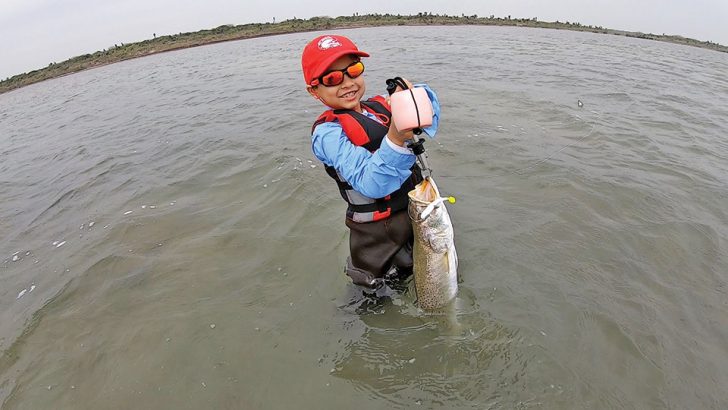
By Capt. Michael Okruhlik
Spring is here, and a lot of fishermen who hang up their gear for winter can’t wait for the temps to rise. Although the enthusiasm is high to wet a line, spring can be the most difficult season to successfully pattern and to consistently catch inshore fish.
Most fish are still in transition between the deep mud and the shallow sand or grass flats, which keeps them spread out through the bays. Add high winds, cool fronts and the small size of the forage, and you have a tougher puzzle to put together than the other three seasons. Here are a few tips to help you sort though this maze and hopefully land a few more fish this spring.
First and foremost, baitfish are extremely small this time of year, and it is not uncommon to find dozens of small glass minnows in the bellies of trout and redfish in the spring. This makes my first tip obvious, so I won’t waste a lot of space here, but downsize your lure presentation if you can. Obviously, this can impact one’s casting abilities, so rigging small lures in tandem can be a plus and assist in casting distance.
Something else I like to use in the spring is a clear or transparent lure with some glitter, or maybe one with a light translucent color. I choose these because it’s more difficult for the fish to see the lure’s actual size, which gives the appearance that it’s smaller than it actually is. I’ve found this to be a productive alternative to downsizing. While choosing a typical-size trout and redfish lure for this application, I look for one with subtle movements. I like either a darting-style bait or a paddle lure with a very subtle vibration. Strong, big-vibrating tails have their time, but early spring is not one of them.
One thing I notice about schools of small baitfish is their movement. When displaced, they seldom dart deeper, and most of their movement is side-to-side or upward. Due to this characteristic, I also like a lightweight lure with a slow sink rate. I feel this better imitates spring forage movements and increases strikes. I like a lure that twitches side to side that doesn’t sink very fast on the pause.
In early spring while the fish are in transition, they will start to congregate on sandy shores with grass. This will be the main cover for the small fry. While employing these techniques and lure choices, concentrate efforts on broken grass flats with potholes and distinct edges. These areas are best when they are close to deeper water.
I hope you find these tactics helpful and as the weather warms and you enjoy the outdoors, don’t forget to take a kid fishing!
Capt. Michael Okruhlik is the inventor of Knockin Tail Lures, Controlled Descent Lures and the owner of www.MyCoastOutdoors.com.